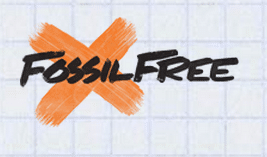This is a guest post by James Lawrence Powell, originally published on GoFossilFree.org
A generation ago, students urged colleges to sell their stock in companies doing business in Apartheid South Africa. At least 155 colleges and universities, as well as 26 state governments, 22 countries, and 90 cities, partially or fully divested. One of the first private institutions to divest was Columbia University, whose trustees said in 1978 that they had done so “to maintain educational leadership,” which demanded “ethical and humane positions that give effective expression to our highest national ideals” (Columbia Spectator, June 8, 1978). In 1986, the University of California sold $3 billion in South Africa-related stocks, the largest public institution to do so.
In 1990, South African President de Klerk began negotiations to end Apartheid. By 1993 it had been largely dismantled and the next year universal suffrage in South Africa led to the election of Nelson Mandela. Desmond Tutu recently said that “We could not have achieved our freedom and just peace without the help of people around the world, who through the use of non-violent means, such as boycotts and divestment, encouraged their governments and other corporate actors to reverse decades-long support for the Apartheid regime.” Two of the largest American investors in South Africa at the time of the divestment movement were U.S. oil companies Mobil and Caltex (a joint venture of Chevron and Texaco.)
Apartheid was not the only cause over which academic institutions and others have divested. Some, including Harvard and Haverford, CCNY and the University of California, as well as foundations, health organizations, insurance companies, and pension funds, sold their stock in tobacco companies. As Harvard president Derek Bok explained in 1990, the university did so because it did not want “to be associated with companies [whose] products create a substantial and unjustifiable risk of harm to other human beings.”
Today, scientists and many others recognize global warming as a far greater threat than Apartheid or smoking. According to award-winning Ohio State climatologist Lonnie Thompson, “virtually all of us are now convinced that global warming poses a clear and present danger to civilization.”
Students and others, frustrated by science denial and inaction in Washington, have begun to urge colleges to sell their stock in fossil fuel companies. Here are ten objections global warming activists are apt to hear from trustees and college administrators, with my responses.
1. “Scientists disagree as to whether global warming is even real.” Among 33,700 authors of peer-reviewed scientific articles on global warming published between 1991 and November 2012, many of them scientists at American universities,only about one author in a thousand rejects human-caused global warming.
2. “Global warming is not a moral issue like Apartheid.” Apartheid was immoral because a class of better-off whites oppressed poor blacks. Global warming is immoral because the third world countries and foundering island nations who are the least responsible will suffer the most. Colleges who showed enough concern for Africans to divest over Apartheid should recognize that global warming is likely already worsening drought and famine in East Africa. Climate models project a future of increasing drought over most of Africa, southern Europe and the Middle East, most of the Americas, Australia, and Southeast Asia.
3. “Global warming is not a health issue like smoking.” A recent study in Health Affairs analyzed the health costs of six “climate change–related events” in the U.S. between 2001 and 2009. The events included ozone pollution, heat waves, hurricanes, infectious disease outbreaks, river flooding, and wildfires. The six accounted for $14 billion in lost lives and health costs (Knowlton et. al, Health Affairs, November 2011 vol. 30, 2167-2176). According to a study published in the medical journal Lancet: “Climate change is the biggest global health threat of the 21st century.” The lead author of the study said, “The impacts will be felt all around the world – and not just in some distant future but in our lifetimes and those of our children.”
4. “Colleges have no direct interest in preventing global warming.” Unlike Apartheid, global warming is already affecting colleges and students directly. The AAUP says that Hurricane Katrina caused “undoubtedly the most serious disruption of American higher education in the nation’s history.” Hurricane Sandy closed dozens of colleges and according to CNN, affected an estimated 1.2 million students. Even if scientists are unsure exactly how much global warming contributed to Katrina and Sandy—not whether they contributed—those two storms and other recent extreme weather events offer an ominous portent of what lies ahead. Colleges will not be immune from the coming heat, wildfire, drought, megastorms, and sea level rise. Today’s college graduates and their children and grandchildren will have to live in the greenhouse world that we are knowingly creating.
5. “We do not invest or divest for social causes.” But colleges did divest over Apartheid, selling their stock in oil companies doing business in South Africa. Harvard, for example , sold Mobil, Shell, and Texaco. Thus the question is not whether a college will divest from fossil fuel companies, but when divestment is justified. By threatening human health and even the future of civilization, global warming is a worse evil than Apartheid and a far greater danger than smoking.
6. “Our sole endowment objective is to maximize investment return.” The overriding obligation of those responsible for a college endowment is to ensure that future student generations benefit to the same relative extent as the current generation. Trustees achieve this balance by adjusting how much of endowment earnings they spend each year and how much they reinvest. But global warming puts a new slant on the matter. By investing in fossil fuel companies, colleges are using their current financial resources in a way that jeopardizes the quality of life of their future alumni. By any reasoned and humane interpretation, this violates colleges’ professed commitment to intergenerational equity.
7. “Selling stock in fossil fuel companies will lower investment return and cause the college to have to make significant budget cuts.” This is the same argument that some colleges made when faced with the issue of divesting over Apartheid, yet many went ahead and found little financial effect. One academic study from 1986 found that “Historical returns since 1959 indicate that the South Africa-free portfolio, diluted with Treasury bills to bring its risk in line with the NYSE, would have outperformed the NYSE by 0.187 per cent annually. ” (Financial Implications of South African Divestment, Blake R. Grossman and William F. Sharpe, Financial Analysts Journal, Vol. 42, No. 4 (Jul. – Aug., 1986), pp. 15-29.) When a college sells stock it has the exact same amount of cash as the market value of the stock at the time of sale, minus transaction costs (estimated at 0.4% in the study of South African divestment), and can reinvest that money. The immediate financial consequences are small and phasing in divestment over several years would ameliorate the long term consequences.
8. “Divestment is controversial and would hurt future fundraising.” Colleges did not let the fear of controversy stop them from divesting over Apartheid. Yes, donations from fossil fuel companies will decline, but gifts from donors who agree that global warming is a moral and a financial issue will rise, and there will be more of those donors. Colleges ought to do what is right, not what is expedient.
9. “Our most effective impact on climate change comes through our teaching, our research, and the careers of our alumni.” While colleges and universities have gone about their business during the second half of the twentieth century, CO2 emissions have risen by 40% over natural levels, enough to make a temperature rise of at least 2°C (3.6°F) during the rest of this century inevitable. In 2011, CO2 emissions rose by 3.2% to the highest level ever recorded. Business-as-usual by colleges has failed to curtail global warming and there is no reason to believe that more business-as- usual will produce a different result.
10. “Divestment won’t do any good.” It is true that divestment will have little financial impact on the fossil fuel companies. Instead, the impact will come from example and moral suasion. Divestment would have the benefit of asking colleges and their trustees, who include some of the most influential members of society, to address global warming and take a stand on an issue that directly affects colleges and their alumni. The publicity from a widespread divestment campaign would call attention to global warming and pressure fossil fuel companies to become part of the solution. In addition, divestment would provide colleges with the funds for a different type of investment. The top 500 colleges have over $400 billion in their endowments. Redirecting just 1% of that amount would free $4 billion for investment in companies that produce clean energy.
Humans have already emitted enough CO2 to ensure that global warming will not end in the lifetime of any person reading this essay. As the years and decades go by and its effects become ever more dire, global warming will grow into a perennial campus issue. It is not going away. Some colleges will take the lead and divest now; others will follow eventually. The question for each college is whether, on the most important issue of this century, it will be a leader or a follower.
To end as Elizabeth Kolbert ended her Field Notes from a Catastrophe, “It may seem impossible to imagine that a technologically advanced society could choose, in essence, to destroy itself, but that is what we are now in the process of doing.”
James Lawrence Powell was Acting President of Oberlin College, President of Franklin and Marshall College, President of Reed College, President of the Franklin Institute, and President of the Los Angeles County Museum of Natural History. Presidents Reagan and George H. W. Bush appointed him to the National Science Board, where he served for twelve years. He has a PhD from MIT and DSc degrees from Berea College and Oberlin College. He is the author of nine books. His most recent print book is The Inquisition of Climate Science (Columbia University Press). Powell currently serves as Executive Director of the National Physical Science Consortium.
Subscribe to our newsletter
Stay up to date with DeSmog news and alerts







